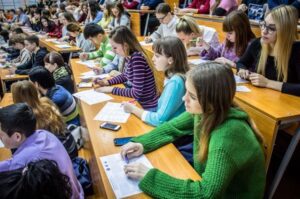
A talent visa is a special residence and work permit designed to attract foreign professionals with exceptional skills or achievements. It is used by countries to strengthen their scientific, cultural, technological, sporting, or business sectors. In the context of growing competition for talent and capital, such programs are becoming part of economic and innovation promotion strategies, helping countries become “talent magnets.”
Professionals in science, technology, business, education, or sports, entrepreneurs and start-ups, investors with a plan to create jobs, as well as creative professionals — artists, musicians, actors, designers, and fashion designers — can apply for a talent visa. Often, graduates of prestigious universities, students with outstanding academic achievements, and public figures fall into the “talent” category. Higher education is not always required: it is more important to have evidence of achievements — publications, participation in conferences, mentions in the media, and letters of recommendation.
In different countries, the visa program for talents has its own name and different requirements. In the US, it is called O-1A or O-1B and is intended for people recognized in the arts, sciences, sports, business, or cinema. The visa is issued for three years with the possibility of extension, and approval is given by the US Citizenship and Immigration Services.
France has a Passeport Talent program that covers investors, professionals, artists, scientists, and athletes. Recently, the income requirements have been reduced to €39,500 per year. Those who have obtained a visa can live and work in France with their families for up to four years, with the possibility of extension.
The UK offers a Global Talent Visa, which allows you to live for up to five years, bring family members, and does not require a high level of English. Confirmation of merit by a relevant British organization is required. Germany has a pan-European program called the Blue Card, which is designed for highly skilled professionals from countries outside the European Union with a university degree or at least three years of work experience and an invitation from a German employer.
Canada uses the Global Talent Stream program, which is aimed at specialists in critical technology sectors. Candidates must have a job offer from a Canadian company and confirm their qualifications. In Australia, a similar program is called the National Innovation Visa. It is aimed at attracting foreigners with outstanding abilities, but the visa application process is long and expensive.
In New Zealand, the talent visa is intended for representatives of the arts, culture, and sports. It is valid for up to 30 months, after which you can apply for a residence permit. In Thailand, the talent visa is part of the Smart Visa program, designed for professionals in science and technology. A minimum one-year contract with an income of at least 100,000 baht per month is required.
The United Arab Emirates has a Golden Visa program that provides professionals, artists, medical professionals, and investors with a five- or ten-year residence permit. Hong Kong has a Top Talent Pass Scheme program designed for wealthy professionals or graduates of prestigious universities. In China, high-level specialists can obtain an R visa for up to ten years. Malaysia has a Residence Pass Talent program for skilled workers with at least five years of experience.
In September 2025, South Korea launched a new K-Star program for leading global experts in science and technology. It provides a fast track to permanent residence and will be fully operational in 2026.
Serbia also has a simplified talent visa option. To obtain it, you only need to confirm your diploma, pay a fee of about €95, and wait up to 90 days. The visa is issued for one year with the possibility of extension and subsequent transition to permanent residence. Language skills are not required.
Experts note that such programs have become a strategic tool for attracting knowledge and capital. Each of them is part of the formula “talent – innovation – economic growth.” Despite similar goals, the requirements vary significantly: in some cases, the process is strict and multi-stage, while in others, it is a fairly simple procedure for confirming competencies. The successful implementation of such programs strengthens the country’s reputation as a center of attraction for talent and investment.
However, it is important to remember the risks. Without transparent selection and integration mechanisms, such visas can become a burden on social and migration systems rather than a driver of development. For Ukraine, such initiatives open up opportunities for professional growth and entry into global markets, and for host countries, they are a way to strengthen their innovative potential.
Overall, Experts Club experts believe that the future of the global economy largely depends on how effectively countries can compete for human capital. Talent visa programs are becoming one of the main tools in this new “battle for minds.”

Currently, 39% of Ukrainian medical institutions are experiencing a shortage of specialists, with a particularly acute shortage in the de-occupied territories.
This conclusion was made by experts of the National Agency humanitarian aid ZDOROVI following the results of the next wave of the quarterly Barometer survey of the state of medicine in Ukraine.
“The shortage of personnel is especially noticeable in the de-occupied territories, as there is a low percentage of specialists returning to their jobs,” the agency said in a press release.
At the same time, according to the agency’s press release, the number of staff in about 47% of medical institutions has not changed compared to the pre-war period.
The researchers note that 76% of medical institutions operate under partial resource shortages, and 11% consider the level of shortage to be critical.
At the same time, more than 60% of respondents noted a significant impact of the work of humanitarian organizations on the level of provision of medical facilities.
At the same time, according to the survey, 69% of respondents rated the level of medical staff training to work in a difficult security situation as average, 20% of respondents called their level low, 45% of respondents identified a critical need for personal protective equipment and special equipment to work in a disaster.
“When specifying the material needs for personal protective equipment and special equipment, respondents most often mentioned individual chemical protective packages, gas masks, chemical protection suits, special vehicles, oxygen stations, generators, gabions, body armor, helmets, and equipment for bomb shelters. 73% of respondents are interested in receiving training in disaster medicine,” the press release says.
The new wave of the Barometer survey involved 180 representatives of medical institutions and health departments from different regions of Ukraine, including the frontline and de-occupied territories.
Zdorovi cooperates with international partners, including ICAP Ednannia, RAZOM for UKRAINE, NOVA Ukraine, Americares, the Netherlands Refugee Council and other charitable foundations and organizations.

SPAR International and SPAR organizations in Europe are helping to solve the issue of employment for Ukrainians who had to move to European countries due to the war, according to a company release.
The company is currently accepting applications (temporary and long-term) from displaced Ukrainian citizens in the 17 EU countries where SPAR operates.
The applications consolidate information about the places of residence of internally displaced persons, the level of language proficiency and professional skills. As reported in the release, SPAR pan-European HR directors are united in an international working group to coordinate applications and place retail specialists from Ukraine in their network.
Founded in the Netherlands in 1932, SPAR International Grocery Store operates over 13,000 retail outlets in 52 countries. Since 2017, the network has been developed in Ukraine by the investment group VolWest Group (Lutsk). The network has 68 stores.

Private higher educational institutions will be able to train specialists on state orders, according to the Ministry of Education and Science of Ukraine.
“For the first time, private higher education institutions will be able to train junior bachelors and bachelors on state order. Such institutions will have access to the ‘State Order’ module of the Unified State Base for Education if they submit an application to the Ministry of Education and Science by May 24, 2021,” the press service of the department said.
The report says that in case of opening access to the Unified State Base for Education and obtaining places of state order, the educational institution will have to comply with the legislation on indicative costs at all levels, specialties and forms of obtaining higher education.